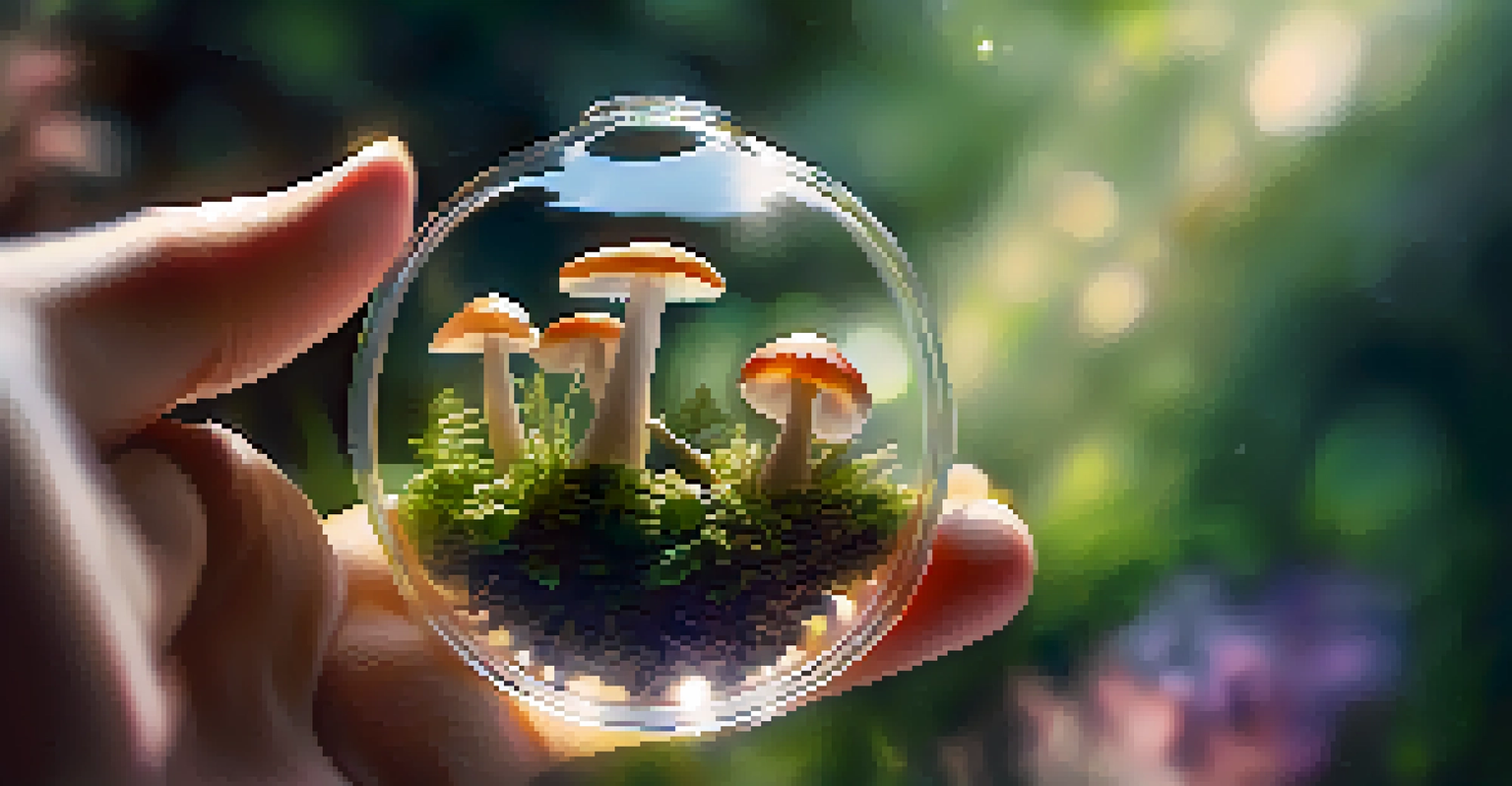Psychedelics: Healing Trauma to Achieve Inner Peace

Understanding Trauma and Its Impact on the Mind
Trauma can be a heavy burden, often lingering in the mind long after the event has passed. It affects not only mental health but also physical well-being, leading to a cycle of anxiety, depression, and stress. Understanding the ways trauma manifests can help individuals recognize its effects on their everyday lives.
The mind is everything. What you think you become.
Many people carry unresolved trauma, which can lead to difficulties in personal relationships and hinder overall emotional growth. For instance, someone who experienced childhood neglect might struggle with trust issues and feelings of worthlessness as an adult. By understanding these patterns, one can begin to seek appropriate healing methods.
This is where the potential of psychedelics comes into play, as they are increasingly being researched for their ability to facilitate emotional processing. The idea is that psychedelics can help break down the walls built around traumatic memories, allowing for a healthier engagement with past experiences.
The Science Behind Psychedelics and Trauma Healing
Psychedelics like psilocybin and MDMA have shown promising results in clinical studies aimed at treating PTSD and other trauma-related disorders. These substances can promote neuroplasticity, which is the brain's ability to reorganize itself by forming new neural connections. This can be particularly beneficial for those stuck in cycles of trauma.

Research indicates that when individuals use psychedelics in a controlled, therapeutic setting, they often experience profound emotional releases. For example, a person may confront and process a painful memory, leading to insights and emotional relief. This process can be transformative and pave the way for deeper healing.
Psychedelics Aid Trauma Healing
Research shows that psychedelics like psilocybin and MDMA can help individuals confront and process traumatic memories, promoting emotional relief and neuroplasticity.
Moreover, psychedelics can induce a sense of interconnectedness, helping individuals realize they are not alone in their struggles. This feeling of unity can reduce feelings of isolation, allowing for a more supportive environment for personal growth and healing.
Personal Stories: Transformative Experiences with Psychedelics
Many who have participated in psychedelic therapy report life-changing experiences. One individual shared how a single session with psilocybin allowed them to confront childhood trauma, leading to a newfound sense of freedom and clarity. Such personal stories highlight the potential of psychedelics as catalysts for healing.
The greatest weapon against stress is our ability to choose one thought over another.
These narratives often emphasize the importance of setting and guidance during the experience. In many cases, participants are accompanied by trained therapists who help navigate the emotional landscape. This creates a safe space where individuals can explore their thoughts and feelings without judgment.
The emotional breakthroughs that occur during these sessions can lead to lasting changes in perspective and behavior. By integrating their experiences into daily life, many individuals find themselves better equipped to handle stressors and improve their relationships.
Psychedelics in Clinical Settings: A Growing Acceptance
As research into psychedelics continues to expand, there is a growing acceptance within the medical community regarding their therapeutic potential. Institutions like Johns Hopkins University and MAPS (Multidisciplinary Association for Psychedelic Studies) are at the forefront of this research, conducting studies that yield encouraging results.
This shift is crucial as it legitimizes the use of psychedelics in treating mental health conditions. As more evidence accumulates, it may lead to changes in legislation, allowing for broader access to these therapies. This could ultimately offer hope to those who have struggled with traditional treatments.
Integration Therapy is Essential
Post-psychedelic integration therapy helps individuals make sense of their experiences, turning insights into lasting behavioral changes and emotional growth.
However, it's important to approach this topic with caution, emphasizing the need for professional guidance. The aim is not to promote recreational use but rather to highlight the potential benefits when used responsibly in a therapeutic context.
The Role of Integration Therapy Post-Psychedelic Experience
Integration therapy plays a vital role in maximizing the benefits of psychedelic experiences. After a session, individuals may feel a rush of insights and emotions that need to be processed. Integration therapy helps individuals make sense of these experiences, ensuring they translate into real-world changes.
In these sessions, therapists assist individuals in reflecting on their experiences, discussing feelings that arose, and how these insights can be applied moving forward. This supportive dialogue can solidify the healing process and promote lasting change in behavior and thought patterns.
For example, someone who experienced a breakthrough regarding their self-worth might work with a therapist to develop strategies for building healthy relationships and setting boundaries. This ongoing support is crucial for maintaining the progress made during psychedelic therapy.
Potential Risks and Considerations of Psychedelic Use
While psychedelics offer promising benefits, they are not without risks. Individuals with a history of certain mental health disorders, such as schizophrenia, may experience adverse effects when using these substances. It is essential to screen for such conditions before proceeding with any treatment.
Additionally, the context in which psychedelics are used greatly influences the outcome. A supportive, controlled environment is crucial to minimize the risk of a negative experience, often referred to as a 'bad trip.' This underscores the importance of professional guidance and a safe setting.
Growing Acceptance in Medicine
As studies validate the therapeutic potential of psychedelics, the medical community is increasingly recognizing their role in treating mental health issues.
Moreover, the conversation around psychedelics should also address potential misuse. As they gain popularity, there is a risk of individuals using them recreationally without understanding their effects. Education and awareness about responsible use are key to ensuring the safety and effectiveness of these therapies.
The Future of Psychedelics in Mental Health Treatment
The future of psychedelics in mental health treatment looks promising, with ongoing research continuously uncovering their potential. As more studies validate their effectiveness, we could see a shift in how mental health issues are approached. This could lead to a wider acceptance of psychedelics as legitimate therapeutic options.
Furthermore, as public interest grows, so does the demand for accessible treatments. This could pave the way for new policies and programs that integrate psychedelics into traditional mental health care. Imagine a world where therapy includes the option of guided psychedelic sessions as a standard practice.

Ultimately, the goal is to provide individuals with varied tools for healing. By combining psychedelics with traditional therapies, we can create a holistic approach to mental health that embraces multiple pathways to inner peace and emotional resilience.